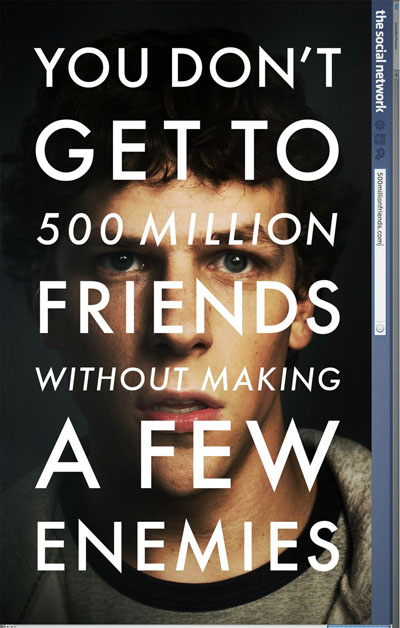Facebook. If Facebook were a country, it would be the third most populous nation on the planet. Consisting of over half a billion users, the social networking hub which began in a Harvard dorm room has grown to be the definitive social network of this age with a net worth of over $20 billion, and in the process, has made founder Mark Zuckerberg the youngest billionaire alive. The Social Network, directed by David Fincher, is the story of how it all came to be.

I have to say, I was skeptical of this movie’s worth. After all, how many people really care about how Facebook was created? And why would Fincher be interested in such a story? This was clearly a departure in terms of content in comparison to his previous movies which include Fight Club and Alien 3. Yet, after seeing The Social Network, one has to commend Fincher for delivering what is potentially a bland, unexciting subject matter with the intrigue and urgency of a thriller.
To begin with, The Social Network’s script truly is an outstanding achievement, demonstrating what a genius the screenplay writer, Aaron Sorkin, really is. Sorkin employs a framed narrative in The Social Network, where from the scene of the Zuckerberg lawsuit, the various characters are introduced and lead to flashbacks of prior events through which both the plot and characters are developed. This framed structure intensifies the mystery behind the eccentric Zuckerberg and events that transpired on the road to the founding of Facebook. Character development in The Social Network, especially that of the protagonist, Zuckerberg, is exceptional, creating a character we loathe and are frustrated by, yet at the same time end up pitying and sympathizing with. The overlapping, rapid-fire dialogue retains a unique feel, giving birth to a new language; a way of speaking no one would use in real life, but one that works brilliantly on-screen. The ingenious dialogue is showcased right off the bat from the opening sequence, with the chaotic banter between Zuckerberg and his ex-girlfriend, Erica Albright, touching simultaneously on multiple subjects ranging from the number of people with genius IQs in China to SATs to Harvard’s final clubs; and is one of the highlights of the movie.
2010 was not exactly a great year for movies in my view. The Social Network is one of the exceptions, and is a rare showcase of pure acting prowess, bringing to the table an interesting cast of young actors including Jesse Eisenberg as Mark Zuckerberg and Andrew Garfield as Eduardo Saverin, the cofounders of Facebook. This diverse cast of relative unknowns and young up-and-comers comes as a surprise, as Fincher most definitely has the clout necessary to bring in the biggest names in the business. Yet he chose to bring in diamonds in the rough, as one might say, and really transforms them into polished gems. The greatest surprise of the cast, though, has to be Justin Timberlake who, well, doesn’t suck. Taking on the role of entrepreneur Sean Parker, the founder of Napster, Timberlake puts on a decent performance as a paranoid, opportunistic entrepreneur who knows a billion dollar idea when he sees one. Eisenberg does a tremendous job portraying a cold, confident, calculating genius who will stop at nothing to see his vision brought to reality; a borderline sociopath, and an “asshole,” or rather, someone “just trying so hard to be one.” Garfield’s character, Saverin, is more warm and amenable as Zuckerberg’s best friend and business partner, making Zuckerberg’s betrayal all the more tragic and impactful.
I should take a moment to also mention the technical aspects of the movie. The dark, washed-out color palette works to complement the movie’s themes of greed and betrayal. Shot using the RED One digital cinema camera, the cinematography simply looks great and makes very good use of depth-of-field, and Fincher manages to capture that unique look his productions have.
To borrow the words of The Washington Post, “what looks on paper like a static series of dead-end conversations comes to life as a vital, engaging, even urgent parable for our age.” Many pundits and critics have called The Social Network a “film that defines our generation,” and a “work of its time.” However, I personally do not see these titles fitting in the sense that this movie’s themes of friendship, loyalty, greed, and betrayal are ones that encompass the literature and drama of all generations. To shortsightedly call The Social Network “the Facebook movie” is not only a misnomer, but an insult to the movie’s value; for underneath the surface, this movie is ultimately the story of a fascinating individual’s greed and ambition, friendships and betrayals, hopes and dreams.

